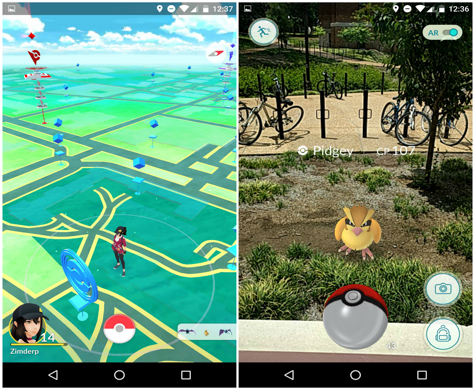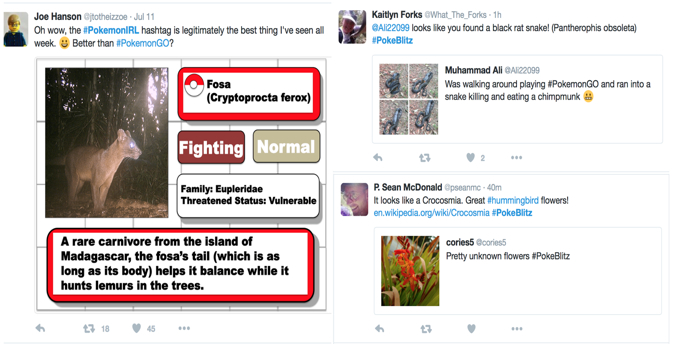This is a post from Zimei Bian. See her bio at the bottom.
If you haven’t been living under a rock for the past two weeks, you’ve probably heard about the new cultural phenomenon sweeping the world–at least in countries where the game has been officially (or unofficially) released — that is Pokémon GO.
(Pokémon Go logo, property of The Pokémon Company)
So what is Pokémon GO, and why are we talking about it on a Computational Sustainability blog? In brief, Pokémon GO is a location-based augmented reality (AR) game on mobile devices that allows players to capture and train virtual creatures “encountered” in the real world from the Pokémon franchise. Players can “hatch” Pokémon eggs by walking certain distances and battle other players for control of Pokémon “gyms” at various landmarks. With the exception of completely optional in-game microtransactions, the application is free to download and play with the help of the built-in GPS and camera capabilities available on most modern iOS and Android handheld devices.
(Screenshots of Pokémon GO gameplay. Image credit: Zimei Bian)
In a little over a week since its release, Pokémon GO has not only surpassed Twitter in terms of active daily users, but has made significant contributions everywhere from increasing voter registration to improving users’ mental health. Looking at these reports, the question arises: can games like Pokémon GO play a part in sustainability efforts? The answer, as it turns out, is that it already has.
In addition to motivating people to explore National Parks, helping communities fall in love with their cities, and encouraging players to pick up trash in public spaces, Pokémon GO has created ample opportunities for users to encounter real life plants and animals as they track down fictional Pokémon (many of which are based on real animals). Scientists on Twitter have caught on to this phenomenon and have created citizen science initiatives under the hashtags #PokeBlitz and #PokemonIRL to help Pokémon GO users identify and learn about the wildlife they come across on their adventures. Judging by the influx of posts with these hashtags, it appears that many users are interested in more than just virtual creatures. But how can we further harness this innate curiosity for sustainability? And what role can gaming play in our efforts?
(#PokeBlitz and #PokemonIRL tweets on Twitter)
Two weeks ago, I attended the 4th International Conference on Computational Sustainability at Cornell University, where Computational Sustainability experts and enthusiasts from all over the world gathered to share their research. Many of the talks were centered around wildlife conservation and the potential impact of citizen science in these sustainability efforts. One of my personal favorite projects in this category was eBird, a highly successful CompSustNet project launched in 2002 by the Cornell Lab of Ornithology and National Audubon Society that provides an intuitive web application for bird watchers across the globe to report observations and access information about their personal records as well as interactive visualizations of all collected data. Despite the popularity of the project in the global birding community, one of the points of discussion that arose around eBird and citizen science projects in general (iNaturalist, Project Noah, etc.) was how to attract and retain users that are not already experts–or even prepossess some particularly strong interest–in the field. In this respect, I believe that we can learn a lot from Pokémon GO, an application that has somehow managed to attract an abundance of users from all walks of life — many of whom were not fans of Pokémon (or even exercise, in many cases) in the past.
In her previous post on this blog, Selina Chen wrote about the importance of providing ways for the average citizen to feel that they can be involved in and make substantial contributions to sustainability efforts. One way to do this, as mentioned in the aforementioned post, is by bringing the issues home and highlighting their impact on a local scale. The widespread appeal of Pokémon GO suggests another potential method: by making it so that exploring and contributing to sustainability causes is fun. While this may not seem like a particularly sophisticated suggestion, research shows that having fun motivates further pursuits of knowledge and increases the likelihood of meaningful connections being made during learning in both children and adults. And what does it say about the power of fun that in just a little over a week from the game’s launch, Pokémon GO players from all over the world have already banded together to contribute observations to extensive crowdsourced Pokémon species-sighting maps–an endeavor eerily similar to what wildlife conservation scientists have been encouraging people to do for years? The Fun Theory, an initiative of Volkswagen, is dedicated entirely to the idea that “something as simple as fun is the easiest way to change people’s behaviour for the better.” One illustration of this initiative’s many incredibly simple but effective ideas can be viewed below:
(“Bottle Bank Arcade”, one of many ideas from Volkswagen’s The Fun Theory initiative.)
Winston Churchill once said, “I am always ready to learn although I do not always like being taught.” The reason that this quote has survived for so long after its originator’s death is because we can all relate to it. The same could be said about keeping our New Year’s resolutions and practicing socially-and-environmentally responsible behavior–we all want to do it, but it’s often inconvenient and much easier to just toss to the side. How can we motivate the average person who is undoubtedly already busy with their own lives to learn about, care about, and contribute to solving global sustainability problems? With all the conversation around the wildly successful Pokémon GO right now, there really is no better time to start thinking seriously about how the Computational Sustainability field can utilize games and emerging gaming technologies to engage and motivate a wider demographic to start taking part in our sustainability efforts.
Who knows? We may even have some fun in the process.
Zimei Bian is a CS undergrad at Vanderbilt University with a special passion for interactive storytelling and using tech for social good. In her spare time, she enjoys internet cat pictures and story-driven video games. The opinions expressed herein are Zimei’s and not necessarily those of Cornell University. You can reach Zimei at zimei.bian@vanderbilt.edu.


